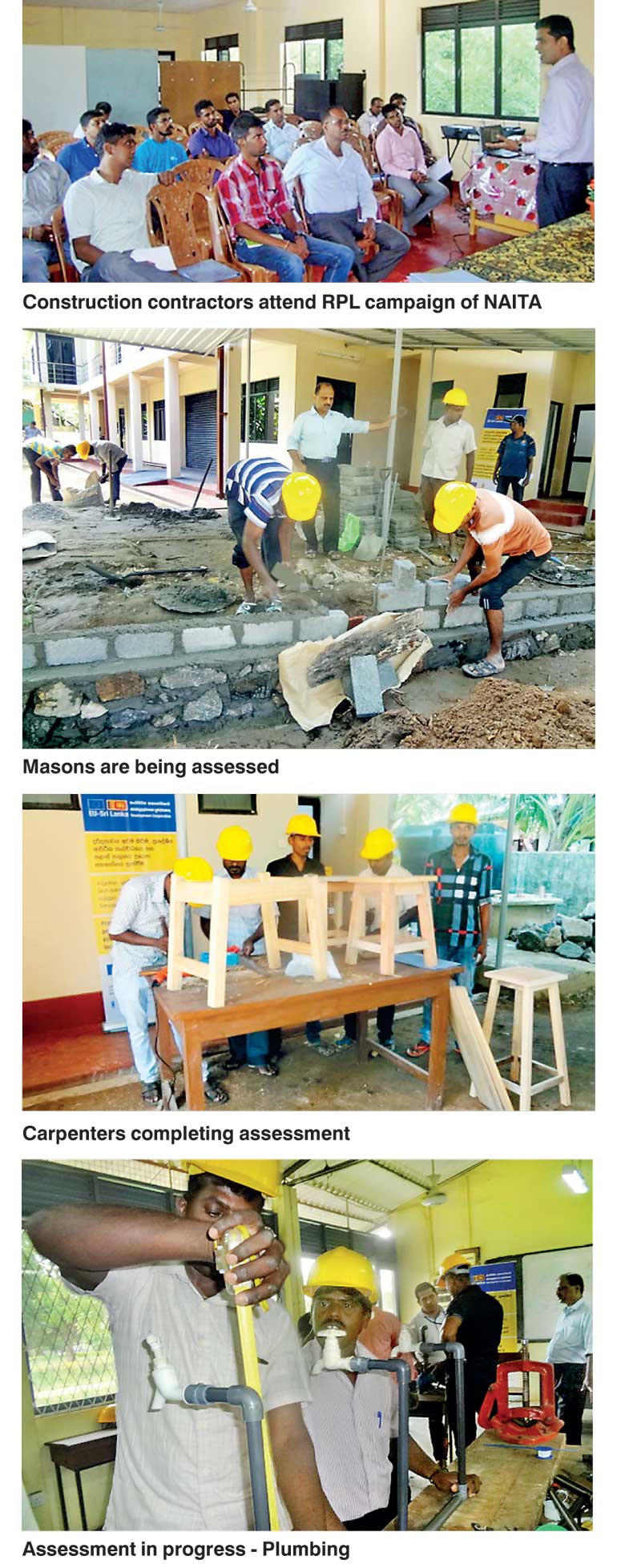Saturday Feb 21, 2026
Saturday Feb 21, 2026
Tuesday, 23 February 2016 00:00 - - {{hitsCtrl.values.hits}}
 As a part of human resource capacity building in former conflict-affected regions now moving towards rehabilitation and resurgence under the European Union Support to District Development Programme (EU-SDDP), the United Nations Office for Project Services (UNOPS) and International Labour Organization (ILO) have joined hands to increase the skilled labour force in the construction sector of Batticaloa, Mannar and Vavuniya. The agencies are working together with the National Apprentice and Industrial Training Authority (NAITA) and the Department of Technical Education and Training (DTET) in achieving this objective.
As a part of human resource capacity building in former conflict-affected regions now moving towards rehabilitation and resurgence under the European Union Support to District Development Programme (EU-SDDP), the United Nations Office for Project Services (UNOPS) and International Labour Organization (ILO) have joined hands to increase the skilled labour force in the construction sector of Batticaloa, Mannar and Vavuniya. The agencies are working together with the National Apprentice and Industrial Training Authority (NAITA) and the Department of Technical Education and Training (DTET) in achieving this objective.
These activities are being implemented with financial assistance provided through the EU-SDDP, with a total financial envelope of EUR 60 million. The programme aims to support the Government of Sri Lanka’s thrust for economic and social development in seven conflict-affected districts covering half a million people. The EU-SDDP is implemented by six organisations including UNOPS and ILO. While the agencies are entrusted to deliver on the components under their specialised areas, inter-agency cooperation and joint interventions are promoted to make best use of resources and to maximise the benefits of interventions.
A common issue for most workers in the construction sector is that although they have the practical knowledge earned through years of experience, many are considered as unskilled labour since their skills are not properly recognised in a formal manner. This leads to them receiving a lower wage rate than if they had been recognised as skilled labourers. One of the key methods in determining if people qualify as skilled labour is certification through Recognition of Prior Learning (RPL) systems. Most construction sector labourers are often unaware of these certifications and how they can enrol in such programmes, and are thus missing out on enhanced career opportunities and financial earnings. This is common in other sectors such as light engineering and IT as well.
To overcome this problem, ILO signed up a contract with National Apprentice and Industrial Training Authority (NAITA) to conduct series of awareness programmes in these districts, collect applications to receive National Vocational Qualification (NVQ) certification through RPL, conduct assessment and certify the successful applicants. As the first stage, at least 100 workers per district will get recognition of their competencies and certified. Further to this, 200 more workers per district will receive similar certification.
UNOPS joined forces with the ILO, under EU-SDDP to improve skilled labour in the region by providing the NVQ. The engineers in the UNOPS teams are now providing opportunities for the workers to develop their skills in the worksites under UNOPS interventions in the Batticaloa, Mannar and Vavuniya districts. The engineers who facilitate training also ensure the participants are well prepared for the assessments conducted by NAITA. A total of 100 workers employed directly by UNOPS or by contractors implementing work within EU-SDDP have already been identified to benefit from this opportunity in the three districts. Currently out of the 100 identified, 45 have been assessed (20 in Vavuniya and 25 in Mannar). The NVQ will be their first formal recognition of their profession and will support them in many ways in future.
Simultaneously, the team members of the UNOPS office in Vavuniya are also assisting in training organised by DTET under ILO support. UNOPS assists skills development in Occupational Safety and Health (OSH) at Worksite for students following the Construction Supervisory course supported by the ILO at Technical College in Vavuniya. As construction sites managed by UNOPS are good places to gain first-hand experience for construction supervisors, the UNOPS teams are happy to welcome such apprentices in the three districts. These joint initiatives by UNOPS and the ILO where professionals in the sector provide training and mentoring as a best practice, have been appreciated by the district authorities.
In addition to training in the construction sector, UNOPS and ILO in Vavuniya in close collaboration with NAITA also conducted a workshop on Money and Family Financial Management for around 50 LTTE ex-combatants undergoing rehabilitation, with the support of the Sri Lanka Army. The group of ex-combatants, who received the training, completed their rehabilitation process and were reintegrated into the community in November. The training comprising applied examples and practical discussions, was met with a high level of interest and enthusiasm by the group as they recognised the importance of such knowledge in carrying out their day-to-day financial management once they move back into society.
Under the EU-SDDP framework, the ILO is working on developing skills for local economic development in Mannar, Vavuniya, Batticaloa and Ampara districts to benefit more than 5,000 people directly. UNOPS is contributing to the construction and rehabilitation of social infrastructure and specific capacity building activities in Batticaloa, Mannar and Vavuniya district to benefit more than 400,000 people.